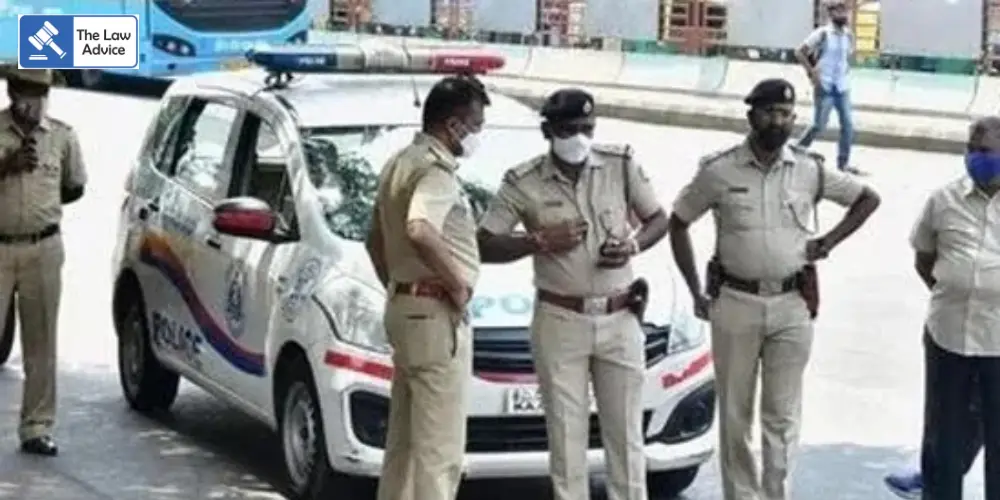
The Gujarat High Court has reaffirmed that while police officers enjoy certain statutory protections, they are not above the law, emphasizing that being intoxicated while on duty severely undermines public confidence, institutional integrity, and the discipline essential in the police force.
Justice R.T. Vachhani, while dismissing a criminal revision application filed by Mahendrasinh Balusinh Raol, a police constable convicted under Section 66(1)(b) of the Bombay Prohibition Act, 1949, observed that law enforcement officers are expected to maintain the highest standards of conduct, and any lapse, particularly involving alcohol consumption on duty, constitutes serious misconduct.
The case dates back to 2003, when the applicant, then posted on point duty, was found inebriated, unable to stand properly, slurring his speech, and reeking of alcohol. Upon being questioned, he failed to produce any valid pass or permit authorizing alcohol consumption. The Forensic Science Laboratory (FSL) report later confirmed 0.0945% w/v of ethyl alcohol in his blood sample—well above the statutory limit of 0.05% under the Explanation to Section 66(1)(b).
In February 2010, a Metropolitan Magistrate in Ahmedabad convicted Raol under Section 66(1)(b) but acquitted him under Section 85(1)(3), observing that while consumption was proven, loss of self-control or indecent behaviour in public was not established. He was sentenced to three months’ simple imprisonment and fined ₹500. His appeal before the City Civil and Sessions Court, Ahmedabad, was dismissed in 2011, prompting him to approach the High Court.
Arguments Before the High Court
Counsel for the applicant argued that the conviction under Section 66(1)(b) could not stand after acquittal under Section 85(1)(3), as both provisions were allegedly interconnected. It was further contended that Rule 4 of the Blood Test Rules was not followed—particularly concerning sterilization of syringes, mixing of preservatives, and safe custody of the blood sample. Additionally, the defense pointed to a five-day delay between the collection of the sample (December 14) and its receipt at the FSL (December 19), claiming it rendered the report unreliable.
The prosecution, however, asserted full compliance with procedural requirements. It submitted that disposable syringes were used, preservatives were added, and the sample was forwarded within the statutory seven days. It was further argued that Section 85(1)(3) pertains to visible loss of control or public disorder, while Section 66(1)(b) concerns proof of consumption alone—making acquittal under one provision irrelevant to conviction under the other.
The prosecution also stressed that the applicant’s role as a police constable aggravated the gravity of the offence, as his conduct set a poor example for the force and undermined public confidence in law enforcement.
After examining the evidence, Justice Vachhani found no perversity or illegality in the concurrent findings of the lower courts. At the outset, the Court observed:
“Police officers enjoy certain protections; however, they are not above the law. Being found intoxicated while on duty undermines the integrity and efficiency of police personnel and erodes public trust in law enforcement agencies.”
The Bench referred to the Supreme Court’s ruling in State of Kerala v. Puttumana Illath Jathavedan Namboodiri (1999) 2 SCC 452, emphasizing that revisional powers are discretionary and can only be exercised to correct manifest errors or prevent miscarriage of justice, not to substitute concurrent factual findings unless palpably perverse.
The High Court agreed with the Magistrate’s conclusion that alcohol consumption was conclusively proven through the FSL report and consistent police testimonies describing the applicant’s inebriated condition. The Court clarified that Section 66(1)(b) creates a statutory presumption based solely on proof of alcohol presence—irrespective of the degree of intoxication or behavioural evidence.
Rejecting the defense claim of procedural irregularity, the Court held that Rule 4 of the Blood Test Rules had been duly complied with, as confirmed by the doctor’s testimony regarding the use of a disposable syringe, addition of sodium fluoride, and proper sealing, labeling, and dispatch of the sample to the FSL.
The Court concluded that the prosecution had successfully established guilt beyond reasonable doubt, supported by medical evidence, witness testimony, and scientific analysis.
Importantly, Justice Vachhani underscored that the applicant’s position as a serving police constable made the offence particularly egregious, calling it a grave breach of professional discipline. The Court referred to the Supreme Court’s precedents in State of Punjab v. Ram Singh (1992), Govt. of Tamil Nadu v. S. Vel Raj (1997), and DIG of Police v. S. Samuthiram (2013), where similar misconduct by police personnel led to dismissal or punishment, underscoring the imperative of discipline and integrity in policing.
In rejecting the plea for leniency, the Court concluded:
“The minimum sentence imposed is not only justified but necessary to deter similar acts. Grant of probation or reduction would send a wrong signal, undermining discipline and public confidence.”
Accordingly, the criminal revision was dismissed, and the applicant was directed to surrender before the trial court within two weeks to serve the remainder of his sentence.
Case Title: Mahendrasinh Balusinh Raol v. State of Gujarat
Website designed, developed and maintained by webexy